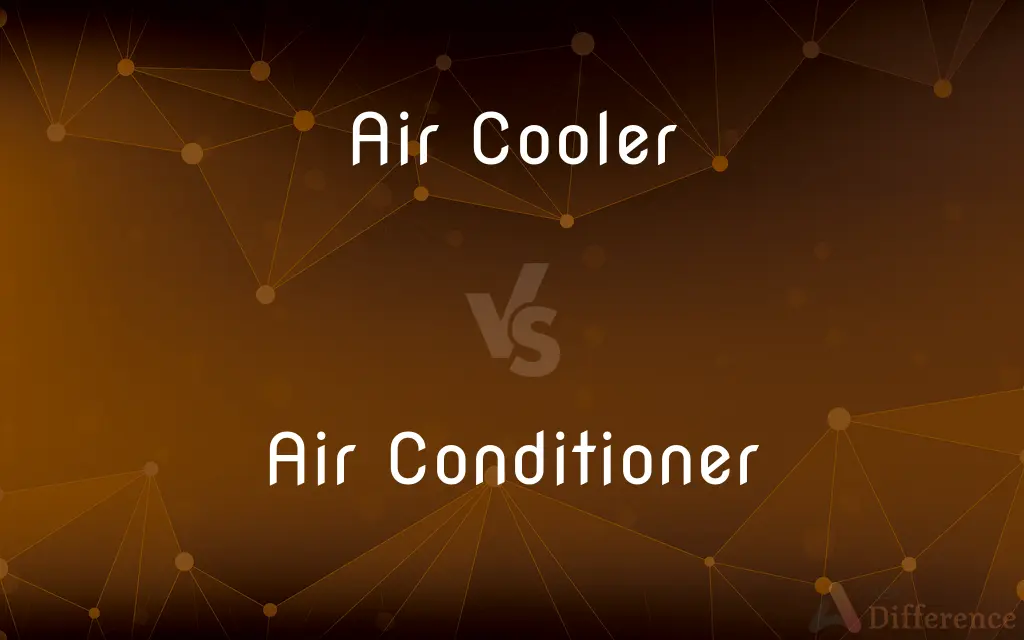Air Cooler vs. Air Conditioner — What's the Difference?
Edited by Tayyaba Rehman — By Fiza Rafique — Published on December 4, 2023
An Air Cooler evaporates water to cool air, while an Air Conditioner uses refrigerants and compressors to change air temperature and humidity.

Difference Between Air Cooler and Air Conditioner
Table of Contents
ADVERTISEMENT
Key Differences
An Air Cooler, often referred to as an evaporative cooler, functions by using the evaporation of water to decrease the temperature of the air. In contrast, an Air Conditioner uses a refrigeration cycle, involving a compressor and a refrigerant, to cool or heat the air.
In terms of operation, an Air Cooler intakes hot air from the environment, passes it over water-saturated pads to cool it, and then circulates the cooled air. On the other hand, an Air Conditioner intakes indoor air, removes its heat using a refrigeration cycle, and returns the cooled air back into the room.
Energy consumption and efficiency differ between the two. An Air Cooler consumes less electricity, primarily powering a fan and a small water pump. An Air Conditioner, with its compressor and other components, tends to consume more power, making it typically costlier to operate.
Environmentally speaking, Air Coolers are greener, using only water and no chemicals. Air Conditioners use refrigerants which, if not properly managed, can harm the environment. Additionally, Air Coolers add humidity to the air, beneficial in dry areas, while Air Conditioners reduce humidity, making them ideal for humid regions.
Comparison Chart
Operating Principle
Evaporation of water
Refrigeration cycle
ADVERTISEMENT
Energy Consumption
Typically lower
Higher due to compressor and other components
Environmental Impact
Eco-friendly (only water used)
Uses refrigerants which can be harmful
Effect on Humidity
Increases humidity
Decreases humidity
Best Used In
Dry areas
Humid or extremely hot areas
Compare with Definitions
Air Cooler
A fan-based system that uses a water pump for cooling mechanisms.
They liked the Air Cooler because it was simple and required minimal maintenance.
Air Conditioner
A system that consumes more power due to its compressor-based operation.
They noticed an increase in their electric bill after running the Air Conditioner daily.
Air Cooler
A machine that circulates air over water-saturated pads for cooling.
The room felt refreshing once the Air Cooler was turned on.
Air Conditioner
A machine that uses a refrigeration cycle for cooling or heating.
She set the Air Conditioner to a comfortable 72°F.
Air Cooler
An energy-efficient alternative to traditional air conditioning.
To save on electricity bills, they opted for an Air Cooler.
Air Conditioner
A device that regulates indoor temperature and humidity.
The Air Conditioner made the muggy day feel pleasant indoors.
Air Cooler
A device beneficial in dry regions due to its humidity-adding properties.
The Air Cooler not only cooled the room but also made the air feel less dry.
Air Conditioner
An appliance ideal for humid areas due to its dehumidifying properties.
Living in Florida, having an Air Conditioner was a necessity.
Air Cooler
A device that uses water evaporation to cool the air.
She bought an Air Cooler to combat the dry summer heat.
Air Conditioner
A comprehensive solution for indoor climate control.
The Air Conditioner not only cooled the room but also filtered the air.
Air Conditioner
Alternative spelling of air conditioner
Common Curiosities
Is an Air Cooler more energy-efficient than an Air Conditioner?
Yes, an Air Cooler generally consumes less electricity than an Air Conditioner.
Do Air Conditioners always decrease humidity?
Typically, yes. Air Conditioners remove moisture from the air, reducing humidity.
How does an Air Conditioner cool the air?
An Air Conditioner uses a refrigeration cycle involving a compressor and refrigerant.
What principle does an Air Cooler operate on?
An Air Cooler operates on the principle of water evaporation.
Which uses more water: Air Cooler or Air Conditioner?
An Air Cooler uses water directly for cooling, while most Air Conditioners don't.
Which is better for dry climates: Air Cooler or Air Conditioner?
An Air Cooler is generally better for dry climates as it adds humidity to the air.
Can an Air Conditioner heat the air too?
Yes, some Air Conditioners come with a heating function as well.
Why is my Air Cooler not cooling effectively?
Ensure the water pads are clean and there's sufficient water in the tank for effective cooling.
Why is my Air Cooler making the room feel humid?
Air Coolers add moisture to the air through the evaporation process, increasing humidity.
Can I use an Air Cooler in a humid environment?
It's not ideal, as Air Coolers add moisture to the air, potentially making a humid environment feel uncomfortable.
Do Air Conditioners require more maintenance than Air Coolers?
Generally, yes. Air Conditioners have more complex components that may need regular servicing.
How often should I service my Air Conditioner?
It's advisable to have your Air Conditioner serviced at least once a year.
Share Your Discovery

Previous Comparison
Affirmative Sentences vs. Assertive Sentences
Next Comparison
E-Commerce vs. M-CommerceAuthor Spotlight
Written by
Fiza RafiqueFiza Rafique is a skilled content writer at AskDifference.com, where she meticulously refines and enhances written pieces. Drawing from her vast editorial expertise, Fiza ensures clarity, accuracy, and precision in every article. Passionate about language, she continually seeks to elevate the quality of content for readers worldwide.
Edited by
Tayyaba RehmanTayyaba Rehman is a distinguished writer, currently serving as a primary contributor to askdifference.com. As a researcher in semantics and etymology, Tayyaba's passion for the complexity of languages and their distinctions has found a perfect home on the platform. Tayyaba delves into the intricacies of language, distinguishing between commonly confused words and phrases, thereby providing clarity for readers worldwide.
















































